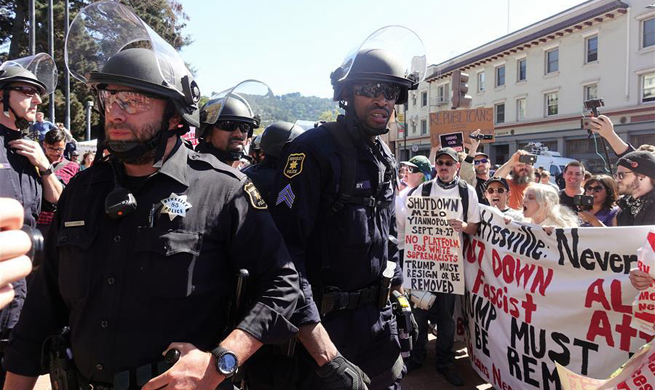by Keren Setton
JERUSALEM, Sept. 25 (Xinhua) -- The Israeli leadership finds a partner in the American administration and hopes to change the position towards the Iranian nuclear program and the international agreement aimed at curbing it.
Events in recent weeks and statements by Israeli and American leaders at a recent UN forum suggest there are many under water currents and their direction is not clear yet.
The calm on Israel's borders is misleading. Judging by events and statements of the past week, it seems the players on the arena are preparing for a confrontation.
This month, the Israeli military completed a two-week long military exercise along its northern border with Lebanon and Syria.
It was the largest such drill in the past two decades.
According to the Israeli Defense Forces (IDF) Spokesperson Unit, the exercise was aimed at improving its readiness for war "with a focus on the Lebanese front."
Last week, Israeli Prime Minister Benjamin Netanyahu spoke at the United Nations General Assembly (UNGA) and issued a threat against Iran and its nuclear program.
"For those who threaten us with annihilation, put themselves in mortal peril, Israel will defend itself with the full force of our arms," said Netanyahu.
Israel's border with Lebanon is a tense one. Lebanon is home to the Iranian-backed Hezbollah militant organization.
Hezbollah and Israel fought their last war in 2006. Since then, there have been numerous minor incidents along the border, but the consensus within the Israeli military establishment is that a renewed confrontation is a matter of time.
Iran, which backs Hezbollah, is under the restrictions of an international nuclear agreement, the JCPOA (Joint Comprehensive Plan of Action).
The agreement was signed to the dismay of Netanyahu, with the enthusiastic endorsement by then U.S. President Barack Obama.
The current U.S. President Donald Trump has been vocal against the agreement. He has yet to take action against it.
Iran, which is also backing Syrian troops in the Syrian civil war, is becoming a closer threat to Israel.
On the same day of Netanyahu's UN speech, Israel downed a drone that entered its northern airspace. An Israeli military spokesman told reporters at the scene that it was believed to be an Iranian-made vessel used by Hezbollah.
Iran's nuclear aspirations have been a concern for Israel for years.
Netanyahu now has a partner at the White House to either "fix it or nix it," as he said about the agreement at the UN.
"Both governments have basically put the JCPOA in the cross hairs," said Dr. Or Rabinowitz from the International Relations department of the Hebrew University of Jerusalem.
"There seems to be an agreement forming between Trump and Netanyahu about the need to either change...simply take down or somehow otherwise damage the JCPOA," she said. Rabinowitz is an expert on nuclear proliferation.
Netanyahu and his government have been critical of the lax agreement, saying the inspection mechanism is weak and allows Iran to secretly continue developing its nuclear weapons.
The agreement does not address Iran's development on non-nuclear weapons. Just days after Netanyahu's address at the UN, Iran tested a long-range ballistic missile in a clear provocation.
"Even if the JCPOA would be met to the letter by the Iranian regime, they could still develop their missile program," said Rabinowitz.
Still, not all Israeli officials are against the agreement.
"Many in the security establishment actually think that it is in the Israeli interest to keep the JCPOA because...it keeps Iran under certain cuffs and under ties. Iran...basically had to declare that it will never ever develop nuclear weapons," she added.
The Iranian leadership, which has threatened to wipe Israel off the map several times, is viewed by many Israelis as a cunning and deceitful regime.
In a recent interview to Israeli news website Ynet, Israel's Chief of Staff, Gadi Eizenkot said Iran was currently upholding its part of the bargain for 'tactical reasons.'
"Their long term strategic goal is to attain nuclear capability. Our challenge to prevent that is at the top of our priorities in the last decade," said Eizenkot.
In the past, the top Israeli commander has been quoted as saying the agreement poses "not only risks for Israel, also opportunities."
For Israel, the long distance to Iran, poses a major challenge to a military option against the nuclear program.
That's why Netanyahu is putting all his money on Trump changing the course of action.
Rabinowitz believes it's 'highly likely' the U.S. leader intends to withdraw his country from the agreement, 'using the clues and the hints he's been dropping along the way.'
However, Netanyahu and Trump's notions are not very popular in the international arena.
Garnering international support, especially the European support, for abandoning the agreement will be an almost impossible task.
Next month, the U.S. President has to re-certify the deal to the American congress. He has to confirm to them whether Iran is believed to be living up to its commitments.
Trump faces opposition within his administration from leading officials who believe the deal should be maintained but perhaps amended to include tougher sanctions on violations and provocations.
His decision will clarify the path he is choosing to take on the matter.
Meanwhile, Netanyahu's threat towards Iran remains a mystery. Will he deliver on it? Will Israel launch a strike against Iranian suspected nuclear sites or will it just continue to attack its proxies?
"That's the million dollar question. It's not completely clear to observers whether Netanyahu is simply posturing, whether he was using his very threatening speech to actually signal that he wants to nix the JCPOA and he's seriously considering launching an attack on Iran...or is he just posturing? Is this the leaderships' way to apply pressure to make sure that the JCPOA is renegotiated again?" asks Rabinowitz.
Netanyahu will have to patiently wait for Trump and his administration to show which direction they plan to steer the ship to.

















